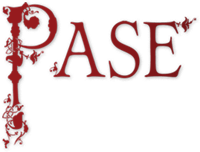FAQs
What is a factoid?
A FACTOID is an assertion that a source says something about one or more people.
How have names been normalized?
In order to make identification and indexing easier – indeed possible – PASE has adopted a scheme of name normalization on the following scheme. This process has not been followed religiously. As with any index, users should become accustomed to the house style.
- Ælf- (first element)
- Æsc-
- Æthel- will be used, and not Oethel-, Æthil-, or Aedil-
- Beadu-
- Beag-
- Beald-
- Beorht- will be used as a first element.
- -berht is to be preferred as a second element for English names (However, for Continental names -bert will be used instead).
- Beorn-
- Bil-
- Blith-
- Bot-
- -burg rather than –burh should be used as a second element for female names as in Cyneburg.
- Cen- is the form to choose for names such as Cenred, Cenwealh and so on.
- Ceol-
- -ceorl
- Cuth-
- Cwen-
- Cyne- is probably to be preferred as a first element in such names as Cyneburg, although we need to seek advice on this one. (Should it be Cyn-?)
- Ead- should be used, although exceptions include: Edgar, Edwin, Edward, Edmund and so on
- Eald- (exception Aldhelm?)
- Ealh-
- Ealu-
- -eald will be kept as a second element, except in Æthelbald, Willibald etc.
- Ean-
- Eard-
- Ecg- will be used as a first element (and not Eg-). Example: Ecgberht
- Egil-
- Eorcen-
- Eostor-
- -flæd will be used as a second element (not –fleda). Example: Æthelflæd
- Folch-
- Forth-
- Freo-
- -frith (second element)
- Fritho-?/Frith-?/Frithe-?/Frithu-?
- Gar-, -gar
- -gifu should be preferred to –giefu in female names
- -gils
- Guth-
- -gyth (f.) should usually be employed. Exception: Edith
- -hæth
- -heah
- Heathu-
- -helm
- Heard- and -heard for Old English names, whereas Old Germanic names will have Hard- and –hard
- Here-, -here
- -hild
- Hilde-
- Hleow-
- Hreth-
- Hroth-
- Hun-, -hun
- Hwæt-
- Hyge-
- In-
- -laf
- Land-
- Leod-
- Leof-
- Mæg-
- Mægen-
- -mann
- -mod
- -mund
- Os-
- Peoht-
- Pend-
- Pleg-
- -red should be used as a second element (Æthelred), but Ræd- should be preferred as a first element (as in Rædwald)
- -ric
- Sæ-
- -sceat
- -sige should be used as a second and a first element (Sige-) and not Sy-
- -stan
- Streon-
- Swith-, -swith
- Tat-
- -thegn
- Thryth-, -thryth (f.) as a second element
- Tid-
- Til-
- Tond-
- Torht-
- Tun-
- -waru (f.)
- Weald- has to be used as a first element, but –wald should be preferred as a second element (except for Bishop Æthelwold, of the Benedictional)
- Wealh-, but -walh or -wealh?
- -weard should be used as a second element. Exceptions include Edward and Hereward.
- Wearn-
- Wær-?
- Wig- and –wig should be used instead of wi or wih
- With- not Wioht-
- -wine should be used in names such as Trumwine. Exception: Edwin
- Wulf- and -wulf
- Wynn- (f.) and -wynn
How do I search by date?
Searches can be refined by Floruit bands. Check the boxes of elements you wish to search by, go to the Selected Persons link on the top bar, select the combination of classifications you wish to use and then choose your floruit range.
What is Floruit dating?
Because of the scarcity of precise dates in Anglo-Saxon history, most people in the database have been given floruit bands on the form early / middle / late’ and ‘century’. E.g. l viii-e ix, would mean ‘late eighth century to early ninth century’. Currently you cannot perform searches by date in PASE. PASE has been source-led; if a source did not supply a date for a factoid, one has normally not been provided.
Why can’t I find...?
PASE’s brief has been to enter all information from all sources written between 597 and 1042. If you cannot find the person you are looking for it may be because that person is known only in later sources. In these cases the information will become available in PASE2. Alternatively you may not have found the normalized PASE name. See the guidelines under ‘How have names been normalized?’ (above).
